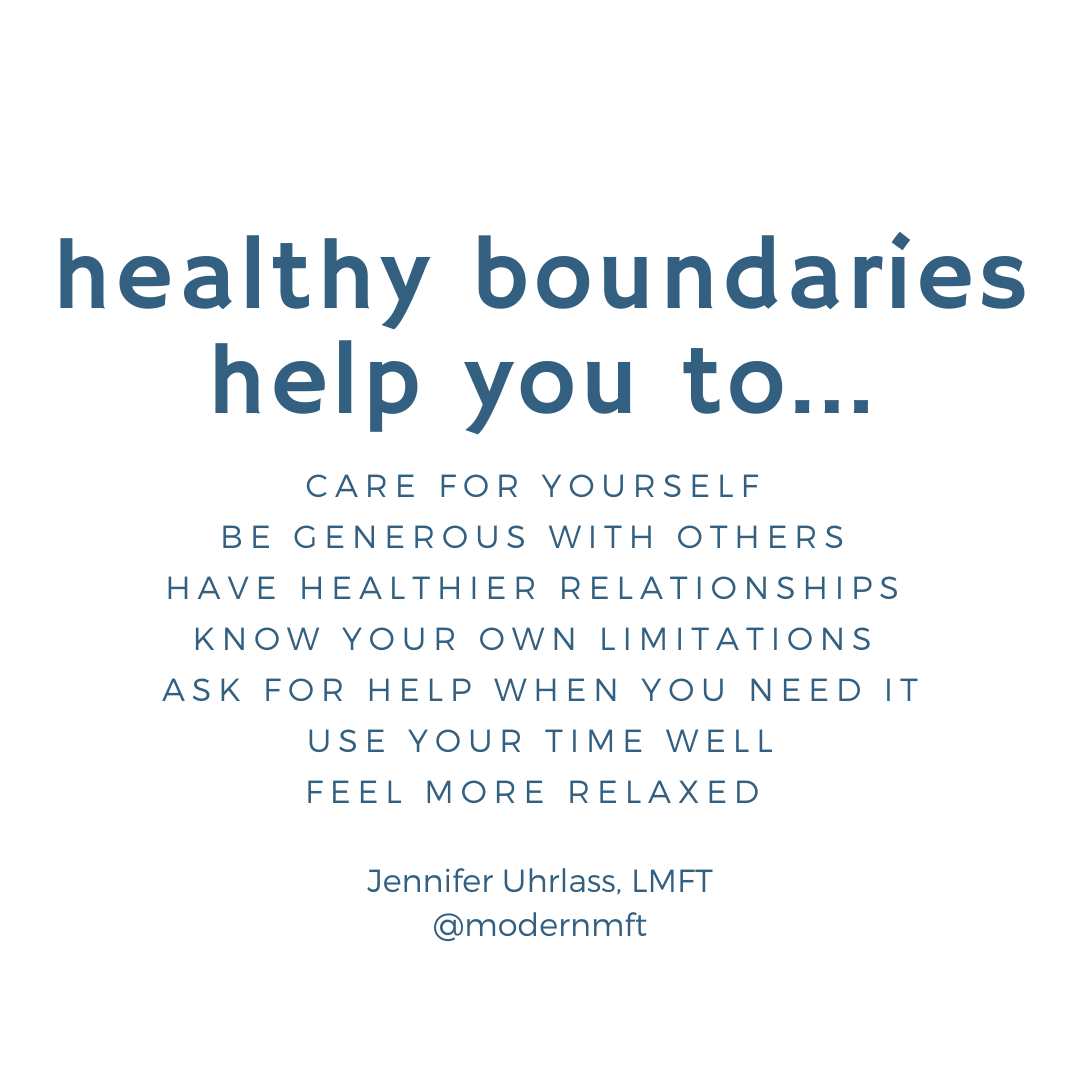Setting better boundaries doesn’t happen overnight…
Deepening your understanding of your current boundary needs and setting a plan to honor them is radical self-love.
If you have a hard time setting boundaries, you might struggle to feel productive or that you’re truly tending to your own needs. Life often feels scary and overwhelming without them. You set boundaries to protect yourself and so you can be at your best. Thinking carefully about your boundaries with self and others helps you to be more intentional.
Can you think of a recent experience where you could have benefited from setting a better boundary?
When I first started my private practice back in 2014, some of the advice I received was “you want to be available anytime so you can accommodate appointments.” It can be easy to overextend yourself in the service of others–especially as a therapist. While this may sound like a great idea in theory, what I’ve learned in my decade of being a practicing therapist is that offering the special service of therapy is a very energy-sensitive kind of offering–one that requires great care to deliver well. If I am not rested, nourished, or if I’m struggling in some way to meet my own needs, it’s not possible for me to provide the best possible service to my clients. In being thoughtful about my boundaries when it comes to type of offering/ when I offer my services and for how long, I am able to map out my time in such a way that allows me to be at my best.
When you have good and clear boundaries with self and others, everyone wins. Because I have thought through my own needs, I’m able to be flexible in certain areas and I also know where I’m not able to be flexible.
What do boundary problems look like?
Boundary problems often present themselves in two ways: diffuse or rigid. When boundaries are too diffuse, we may struggle with enmeshed relationships. Essentially, there is too much closeness. When boundaries are too rigid, we might struggle to let someone in or build healthy connection with others. Essentially, we are too distant and have a hard time trusting others.
Boundary issues are important to correct and work on because they impact how we function in various relationships — with partners, colleagues, family members, friendships, and even on a first date.
Boundary issues can cause serious problems if unaddressed because they can lead us to being taken advantage of, exploited, or unable to feel entitled to stand our ground on an issue. They can also lead to shutting people out, isolating ourselves, and not asking for help when we need it.
In real life this might look like:
- Struggling to say no when you want to
- Not listening to yourself/ going against your judgment
- Indecision for fear of letting others down
- Giving in too easily
- Not being clear with others
- Subordinating your needs to others
- Withholding from others
- Closing self off from connection
- Struggling to reach out
- Struggling to make meaningful connections
What are intrapersonal boundaries?
A critical but often overlooked aspect of this work is intrapersonal boundaries or boundaries within self. We often think of boundaries in the context of being between people, but boundaries within self are just as important.
For example, how you might talk to yourself about engaging in a potentially harmful situation or leaving work at a normal time rather than overworking. Intrapersonal boundary work is especially important since we can’t change others, we can only change ourselves. You can begin to work on boundary issues by practicing out loud what it sounds like/ feels like to say “yes” and “no” in specific situations of your life.
I’ll share more about this in an upcoming post ; )
If you are struggling with this area, here are a few questions that might be helpful to consider:
- My ideal situation would be_____.
- I wish _____ was different about _______.
- What makes it tough to set a boundary when it comes to _______?
- How would it feel to have a more clear boundary in place as it relates to _______?
- What are my top priorities right now?
- What are three areas of struggle for me right now and how long has it felt this way?

